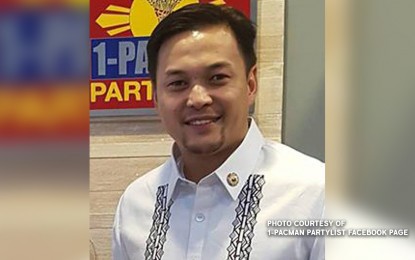
1-PACMAN Partylist Rep. Michael Romero
MANILA -- A ranking lawmaker at the House of Representatives on Thursday said the recent passage of the landmark Pantawid Pamilyang Pilipino Program (4Ps) Act has further strengthened the anti-poverty efforts of President Rodrigo Duterte’s administration.
In a statement, 1-PACMAN Partylist Rep. Michael Romero pointed out that Republic Act 11310, which institutionalizes 4Ps as the government's primary poverty reduction initiative, carries implementation upgrades that further enhance efforts to uplift the marginalized sector from poverty.
The law was signed by President Duterte last April 17, but was released by the Palace only last May 22.
Among the salient features of the 4Ps law include increased cash benefits to qualified recipients, an inflation adjustment provision and the designation of additional modes of cash transfer.
Increased cash benefits
Romero noted that RA 11310 includes a new PHP 700 conditional cash grant per senior high school student of the beneficiary family.
“This is aside from the PHP 500 per child in junior high school and PHP 300 per child for elementary level. These grants are for the 10 months of schooling,” he said.
Aside from these, Romero also pointed out that each household-beneficiary will receive a monthly PHP 750 health and nutrition grant.
The amount is fixed regardless of the number of members in the household.
The health grant replaces the monthly PHP600 rice subsidy being granted in the current program.
Inflation adjustment provision
In the meantime, the House Assistant Majority Leader said the periodic assessment section of RA 11310 calls for inflation adjustment every six years.
“The inflation adjustment provisions of Section 10 of RA 11310 tasks the Philippine Institute of Development Studies (PIDS) to recommend the adjustment of the 4Ps cash transfer amounts using the consumer price index as basis,” he said.
The lawmaker said the law also gave the 4Ps National Advisory Council the mandate to increase the cash transfer benefits to levels that “will ensure that the grant amounts are sufficient to make a positive impact."
"With this periodic assessment mechanism, Congress does not have to keep passing new laws to increase the cash benefits,” Romero said.
Remittance firms, rural banks to soon be tapped for 4ps cash grants releases
Romero, who is one of the key authors of the 4Ps law, said RA 11310 also makes it easier for beneficiaries -- especially those residing in far-flung communities -- to receive their cash grants.
He noted that 4Ps cash grants are currently released through the Land Bank of the Philippines and the Veterans Bank.
"The new law recognizes the fact that there are localities the Land Bank does not adequately serve," Romero said.
Because of this, the party-list lawmaker said the new law authorized the Department of Social Welfare and Development (DSWD) and government depository banks to contract the services of rural banks, thrift banks, cooperative banks, and money remittance outlets duly accredited by the Bangko Sentral ng Pilipinas (BSP), for localities not adequately served by Land Bank.
“4Ps cash benefits can soon be coursed through money remittance outlets and countryside banks so the beneficiaries need not travel far to claim their conditional cash benefits," he said.
"Iyong mga 4Ps beneficiaries sa mga lugar na malayo sa branch ng Land Bank, parating na ang araw na hindi na niyo kailangan bumiyahe o dumayo pa sa kabilang bayan (To 4Ps beneficiaries living in areas far from Land Bank branches, the day will come when you would not have to travel anymore to other towns just to get your grants.)" Romero said.
Other salient features
The 4Ps, deemed as a national poverty reduction strategy and a human capital investment program, provides conditional cash transfer (CCT) to poor households for a maximum of seven years to improve their health, nutrition, and access to education.
Under RA 11310, the DSWD is tasked to select qualified beneficiaries using a standard targeting system and re-validate existing recipients every three years.
Considered eligible for the anti-poverty program are farmers, fisherfolk, homeless families, indigenous peoples, and those who are in the informal settler sector and in geographically isolated and disadvantaged areas.
All qualified beneficiaries will be automatically covered in the National Health Insurance Program.
Every three years after the effectivity of RA 11310, the PIDS is mandated to conduct an impact assessment to evaluate the effectiveness of the 4Ps, the veracity of the list of beneficiaries, and the program implementation.
All 4Ps beneficiaries will also be given priority in the availment of modalities and interventions under DSWD's Sustainable Livelihood Program or other appropriate or similar programs offered by other government agencies or accredited private institutions.
A joint congressional oversight committee is also created to set the overall framework to review the law's implementation, determine inherent weaknesses in the law, and recommend necessary remedial legislation or executive measures. (PNA)
